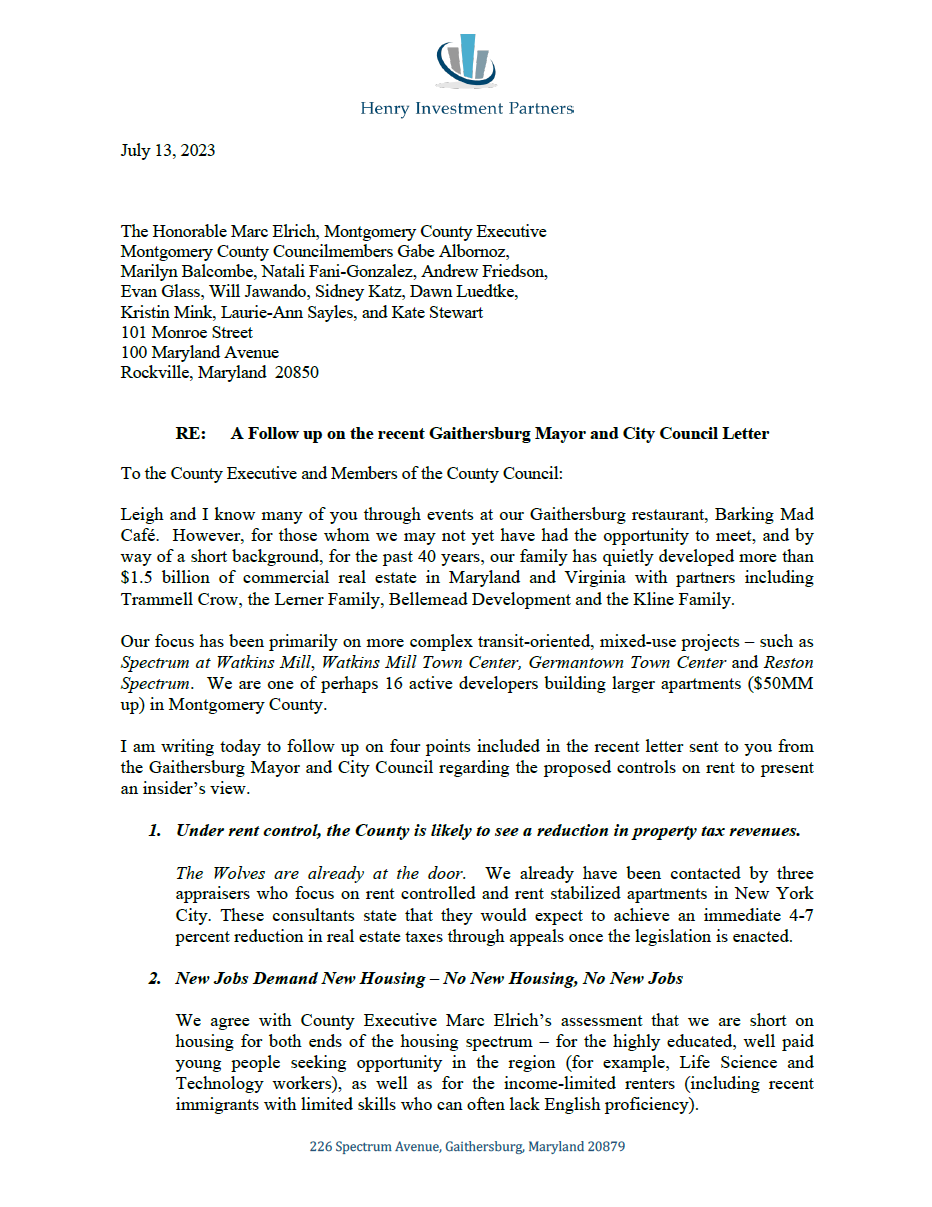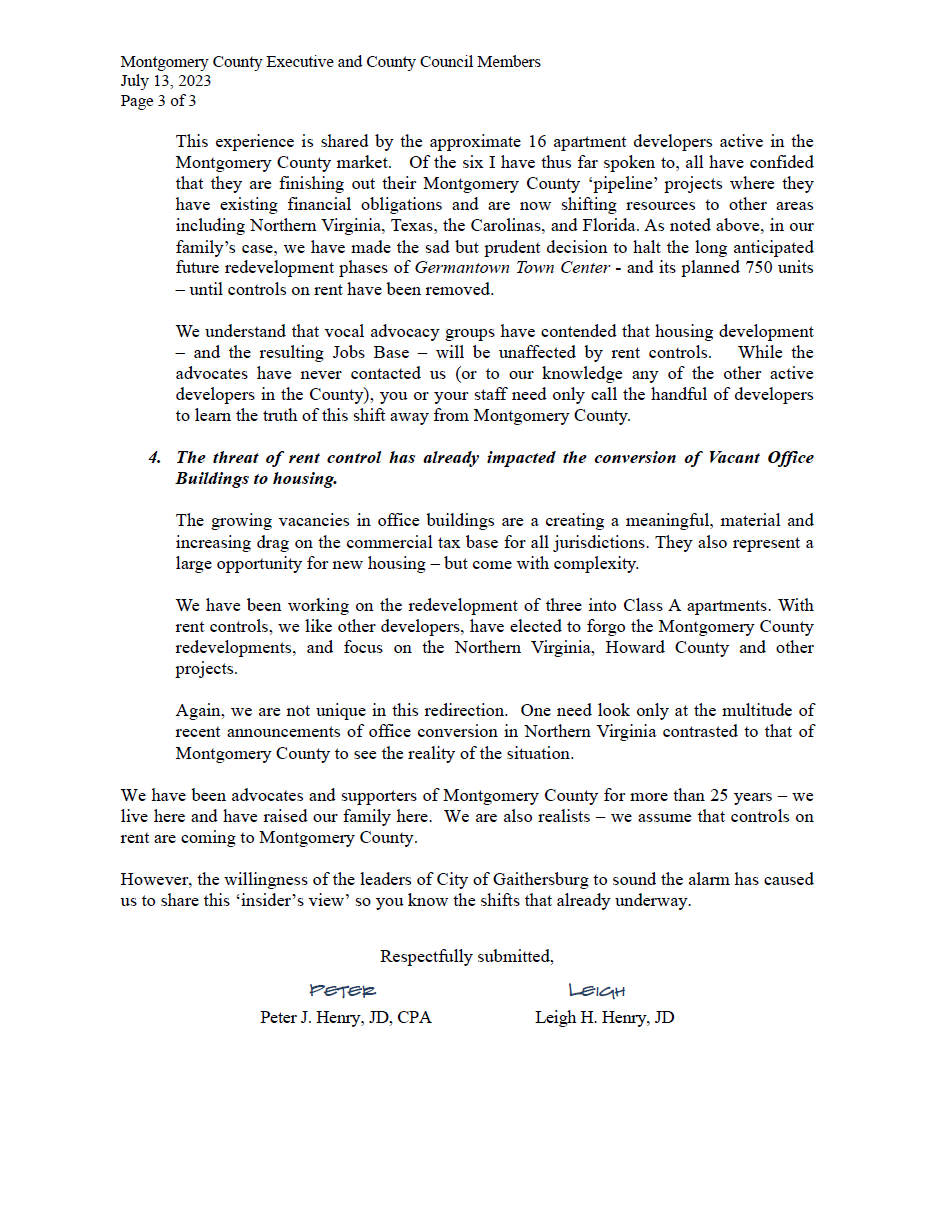By Adam Pagnucco.
A Montgomery County-based developer has written the county executive and the county council with news: their company is stopping a county project because of the pending passage of rent control. And they are not alone as at least six other developers are stopping further projects here and shifting resources to other areas including Northern Virginia.
The letter from Peter and Leigh Henry of HIP Projects, LLC is reprinted below.
*****
July 13, 2023
The Honorable Marc Elrich, Montgomery County Executive
Montgomery County Councilmembers Gabe Albornoz, Marilyn Balcombe, Natali Fani-Gonzalez, Andrew Friedson, Evan Glass, Will Jawando, Sidney Katz, Dawn Luedtke, Kristin Mink, Laurie-Ann Sayles, and Kate Stewart
101 Monroe Street
100 Maryland Avenue
Rockville, Maryland 20850
RE: A Follow up on the recent Gaithersburg Mayor and City Council Letter
To the County Executive and Members of the County Council:
Leigh and I know many of you through events at our Gaithersburg restaurant, Barking Mad Café. However, for those whom we may not yet have had the opportunity to meet, and by way of a short background, for the past 40 years, our family has quietly developed more than $1.5 billion of commercial real estate in Maryland and Virginia with partners including Trammell Crow, the Lerner Family, Bellemead Development and the Kline Family.
Our focus has been primarily on more complex transit-oriented, mixed-use projects – such as Spectrum at Watkins Mill, Watkins Mill Town Center, Germantown Town Center and Reston Spectrum. We are one of perhaps 16 active developers building larger apartments ($50MM up) in Montgomery County.
I am writing today to follow up on four points included in the recent letter sent to you from the Gaithersburg Mayor and City Council regarding the proposed controls on rent to present an insider’s view.
1. Under rent control, the County is likely to see a reduction in property tax revenues.
The Wolves are already at the door. We already have been contacted by three appraisers who focus on rent controlled and rent stabilized apartments in New York City. These consultants state that they would expect to achieve an immediate 4-7 percent reduction in real estate taxes through appeals once the legislation is enacted.
2. New Jobs Demand New Housing – No New Housing, No New Jobs
We agree with County Executive Marc Elrich’s assessment that we are short on housing for both ends of the housing spectrum – for the highly educated, well paid young people seeking opportunity in the region (for example, Life Science and Technology workers), as well as for the income-limited renters (including recent immigrants with limited skills who can often lack English proficiency).
In working with major employers, institutional capital and high technology developers in our recent projects, there are two pivotal, ‘make or break’ questions posed:
- What is the skill set of the existing employment base, and
- Is there adequate new Class A housing being developed – both for sale and for rent – to accommodate the thousands of highly paid skilled workers and their families that we will need to employ?
We and our partners faced these questions in recent Life Science projects in both Frederick County and Gaithersburg – where, for example, we are currently processing a 700,000 square foot Life Science complex, as part of the Mixed-Use, Transit oriented Watkins Mill Town Center project. There, the new development is providing approximately 230 new for-sale homes, as well as four new, six-story Class A rental apartment developments to support the new highly skilled life science workers.
These large, employment-driven projects provide the much-needed incremental tax base – income taxes, property taxes, personal property taxes, impact taxes, and fees – needed to support the growing needs of the residents of the City, County and State.
On the other hand, we have also been working on the Germantown Town Center since it was a raw field more than 25 years ago – first with the Safeway Center and Artery, and including the Blackrock Performing Arts Center, the Upcounty Transit Center, the Park & Ride, the Regal Cinema, Top Golf and many restauranters and retailers.
Working with strong County Planning Staff, the goal has been to convert our singlestory retail pads to series of high-density Class A apartment buildings to support the Transit Center and the projected employment growth in that submarket. To that end the first apartment project was recently completed by the family – the 212-unit Fairchild Apartments, with a second 230-unit project in the preliminary design stage.
However, with the shift in policies capping rents and not expenses (including interest), the risk profile of further redevelopment is too great to continue, and the next phases of the project have been shelved until the market rental re-assumes it prior position.
Without the housing, and in discussion with potential larger employers and capital groups, we sadly no longer project a large, new high skilled workforce materializing in the Germantown Submarket.
3. Rent Control will result in a dramatic slowing of new rental housing development.
Operating costs of an apartment building have risen by significantly more than 6%. This year, we experienced a 22% increase in property insurance for our multifamily projects on the heels of several years of similar hikes in the industry. Our wage and benefits costs have also risen by more than 11%, while other costs are up by more than 8.5%. Energy, replacement appliances, landscaping, and outside contractor costs have also increased significantly – while supply chain and labor expenses have caused some costs to skyrocket.
This experience is shared by the approximate 16 apartment developers active in the Montgomery County market. Of the six I have thus far spoken to, all have confided that they are finishing out their Montgomery County ‘pipeline’ projects where they have existing financial obligations and are now shifting resources to other areas including Northern Virginia, Texas, the Carolinas, and Florida. As noted above, in our family’s case, we have made the sad but prudent decision to halt the long anticipated future redevelopment phases of Germantown Town Center – and its planned 750 units – until controls on rent have been removed.
We understand that vocal advocacy groups have contended that housing development – and the resulting Jobs Base – will be unaffected by rent controls. While the advocates have never contacted us (or to our knowledge any of the other active developers in the County), you or your staff need only call the handful of developers to learn the truth of this shift away from Montgomery County.
4. The threat of rent control has already impacted the conversion of Vacant Office Buildings to housing.
The growing vacancies in office buildings are creating a meaningful, material and increasing drag on the commercial tax base for all jurisdictions. They also represent a large opportunity for new housing – but come with complexity.
We have been working on the redevelopment of three into Class A apartments. With rent controls, we like other developers, have elected to forgo the Montgomery County redevelopments, and focus on the Northern Virginia, Howard County and other projects.
Again, we are not unique in this redirection. One need look only at the multitude of recent announcements of office conversion in Northern Virginia contrasted to that of Montgomery County to see the reality of the situation.
We have been advocates and supporters of Montgomery County for more than 25 years – we live here and have raised our family here. We are also realists – we assume that controls on rent are coming to Montgomery County.
However, the willingness of the leaders of City of Gaithersburg to sound the alarm has caused us to share this ‘insider’s view’ so you know the shifts that already underway.
Respectfully submitted,
Peter J. Henry, JD, CPA
Leigh H. Henry, JD



